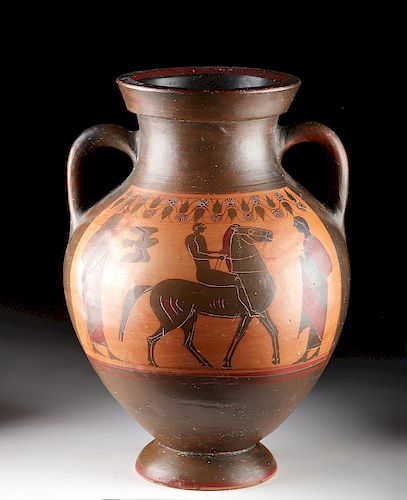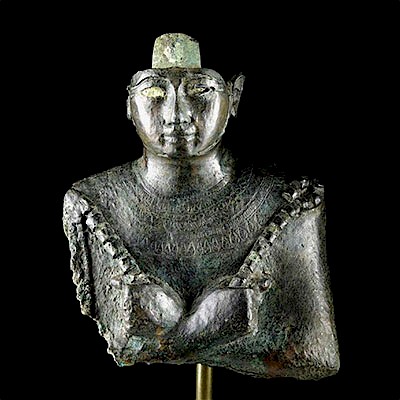Greek Attic Belly Amphora - Princeton Painter, ex-Cahn
Lot 18
About Seller
Artemis Fine Arts
686 S Taylor Ave, Ste 106
Louisville, CO 80027
United States
Selling antiquities, ancient and ethnographic art online since 1993, Artemis Gallery specializes in Classical Antiquities (Egyptian, Greek, Roman, Near Eastern), Asian, Pre-Columbian, African / Tribal / Oceanographic art. Our extensive inventory includes pottery, stone, metal, wood, glass and textil...Read more
Estimate:
$50,000 - $70,000
Absentee vs Live bid
Two ways to bid:
- Leave a max absentee bid and the platform will bid on your behalf up to your maximum bid during the live auction.
- Bid live during the auction and your bids will be submitted real-time to the auctioneer.
Bid Increments
| Price | Bid Increment |
|---|---|
| $0 | $25 |
| $300 | $50 |
| $1,000 | $100 |
| $2,000 | $250 |
| $5,000 | $500 |
| $10,000 | $1,000 |
| $20,000 | $2,500 |
| $50,000 | $5,000 |
| $100,000 | $10,000 |
| $200,000 | $20,000 |
About Auction
By Artemis Fine Arts
May 22, 2019
Set Reminder
2019-05-22 10:00:00
2019-05-22 10:00:00
America/New_York
Bidsquare
Bidsquare : Exceptional Day 1: Antiquities Asian Fine Art
https://www.bidsquare.com/auctions/artemis-gallery/exceptional-day-1-antiquities-asian-fine-art-4129
Day 1 of an important 2-day auction featuring exceptional art from around the world - Egyptian, Greek, Etruscan, Roman, Viking, Russian, Near Eastern; Asian Art from China, Japan, Thailand, Vietnam, Burma, India; Fine Art from the 17th century to present. Artemis Fine Arts info@artemisgallery.com
Day 1 of an important 2-day auction featuring exceptional art from around the world - Egyptian, Greek, Etruscan, Roman, Viking, Russian, Near Eastern; Asian Art from China, Japan, Thailand, Vietnam, Burma, India; Fine Art from the 17th century to present. Artemis Fine Arts info@artemisgallery.com
- Lot Description
Ancient Greece, Athens (Attic), Manner of the Princeton Painter, ca. 540 to 520 BCE. A marvelous belly amphora, decorated via the black-figure technique with tastefully delineated red details. Both sides present a nude youth riding a horse to the right followed by a bird in flight and set between two cloaked confronting figures. All figures are delineated in profile, and in addition to incised details, certain areas such as the horse's manes, highlights on the horse's rear flanks, and passages of the figures' robes are delineated in red. Above these scenes are beautiful grapevines which are also delineated in black with incised as well as red hued details. Size: 10" in diameter x 14" H (25.4 cm x 35.6 cm)
The Princeton Painter was among the contemporaries of famous vase painters such as Exekias who were just as dedicated to the artform and specialized in painting large belly amphorae like this example. The Princeton Painter's vase paintings, according to Trendall, present "careful florals and statuesque figures" and "in many respects these works herald the exhaustion of black figure as a major style of vase painting …" Clearly, the paintings on this vase presents the apex of black figure techniques.
Provenance: private East Coast, USA collection; ex-private California, USA collection, acquired at Auktion 5, Jean-David Cahn, Basel, 5 September 2005, lot 36; ex-private collection, Switzerland (Dr. Gregor Berger, CH-Jona SG, Collection of his father, the late Professor Dr. H.C. Mult Ernst Hern (1928-2006) - former Director of the Basel Museum
All items legal to buy/sell under U.S. Statute covering cultural patrimony Code 2600, CHAPTER 14, and are guaranteed to be as described or your money back.
A Certificate of Authenticity will accompany all winning bids.
We ship worldwide and handle all shipping in-house for your convenience.
#145917Expected age wear to the surface but the painting remains quite vivid. White encrusted caliche deposits on interior. Save a few minor nicks and original slight misfiring, it is fully intact and incredibly well preserved.Condition
- Shipping Info
-
All shipping is handled in-house for your convenience. Your invoice from Artemis Gallery will include shipping calculation instructions. If in doubt, please inquire BEFORE bidding for estimated shipping costs for individual items.
-
- Buyer's Premium



 EUR
EUR CAD
CAD AUD
AUD GBP
GBP MXN
MXN HKD
HKD CNY
CNY MYR
MYR SEK
SEK SGD
SGD CHF
CHF THB
THB
















